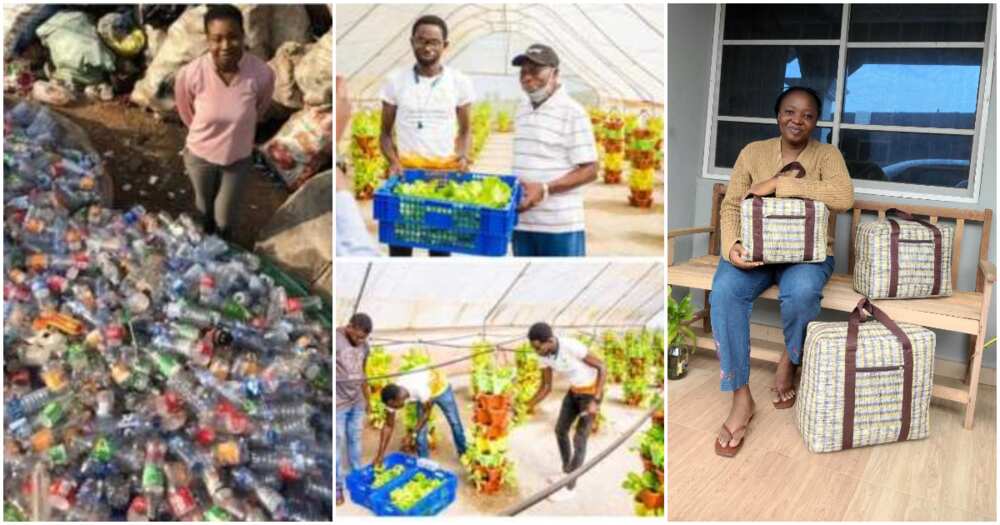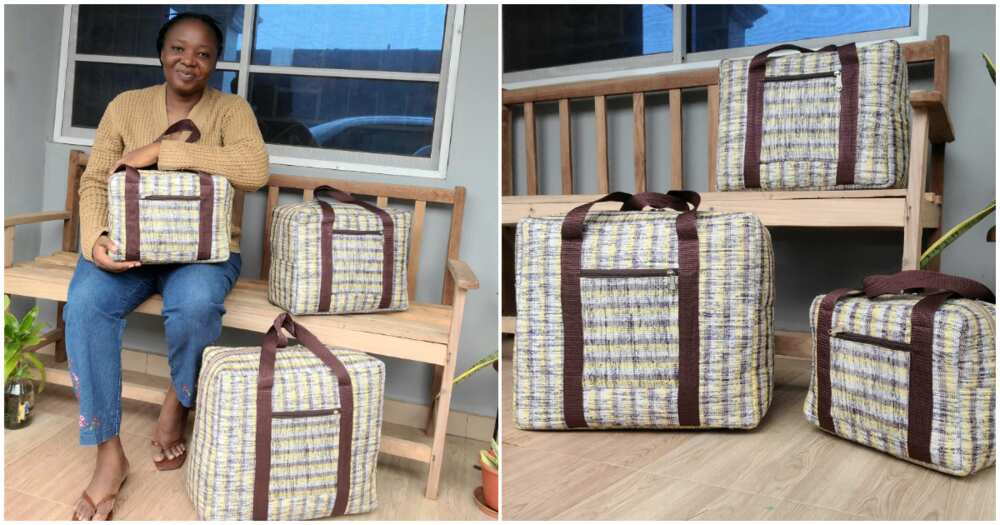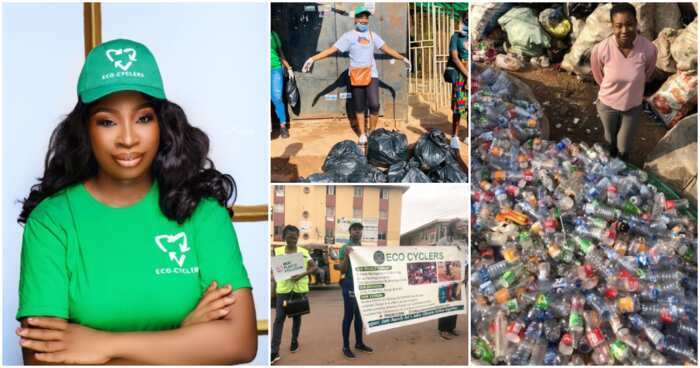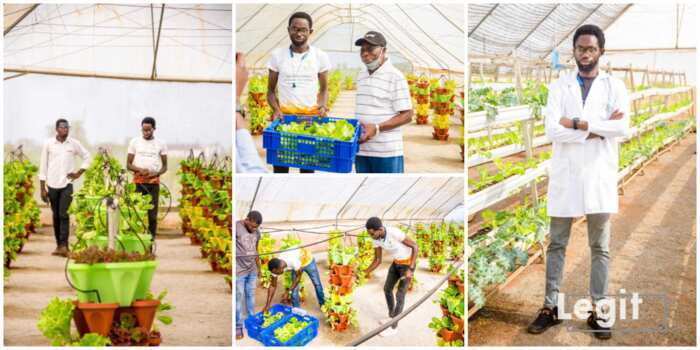Building Greener Future: Spotlight on Nigerian Innovators Tackling Environmental Challenges
Nigeria is at the forefront of a complex battle in a world grappling with pressing environmental issues. From the oil-rich Niger Delta to the bustling streets of Lagos, the nation faces various environmental challenges that demand urgent attention.
Unlock the best of Legit.ng on Pinterest! Subscribe now and get your daily inspiration!
However, amid these challenges, there is a glimmer of hope as individuals and organisations have risen to the occasion, striving to protect and preserve the environment as well as turn some of these challenges into wealth.

Source: Facebook
This article explores the stories of dedicated individuals, environmentalists, farmers and social entrepreneurs combating the challenges head-on in their own ways.
Pressing environmental challenges
Environmental issues encompass the adverse effects on our planet's vital systems—air, water, soil, and more—which have emerged due to human intervention or mishandling of the earth's resources.
PAY ATTENTION: Follow us on Instagram - get the most important news directly in your favourite app!
There are numerous environmental challenges plaguing planet Earth, but Conserve Energy, in an article, asserts that about 20 of them are currently pressing.
The major environmental problems facing the world today include pollution ( of air, water and soil), soil degradation, global warming, generating unsustainable waste, waste disposal, biodiversity loss, ozone layer depletion and genetic engineering.
This article will spotlight the passionate works and campaigns of Adejoke Lasisi, farmer Samson Ogbole and Ogechi Nwonye-Bernard.
Adejoke Lasisi
According to a United Nations Industrial Development Organisation (UNIDO) report, Nigeria generates over 32 million tonnes of waste annually, with plastic accounting for 2.5 million tonnes.
Nigeria ranks among the top 20 countries responsible for 83% of the land-based plastic waste in our oceans.
To further put this challenge into perspective, a World Bank report puts the daily waste generated per person in Nigeria at 0.51 kilograms, with a staggering projection of 107 million tonnes by 2050.

Source: Facebook
This presents a significant challenge but also opens up opportunities for sustainable solutions, and Adejoke Lasisi has taken advantage of this opportunity.
Through her Planet3R organisation, the Economics graduate of Obafemi Awolowo University (OAU), Ile-Ife recycles waste such as sachet water nylons and transforms them into beautiful shopping bags, clothes, bags and paintings.
The woman, in her 30s, told Legit.ng in an exclusive interview that she grew up not wanting to see waste around her. Then she began to ask questions and wonder where the trash ended up, which inspired her to do something to improve the environment.
"...I was born into a family that loved weaving. I did not like seeing wastes around me. Even though we were not doing anything with it then, we just packed the nylon and throw them away.
I asked myself where these wastes end up. So, even when I graduated and set up a school for teaching Aso Oke weaving, I felt I wasn't doing enough for the environment. I thought of what to do with the waste people litter around on the streets, as where I stay can be described as a semi-rural area.
"I knew I could weave, and then I thought of using my weaving skills to convert the wastes into something meaningful," she said.
Her strides in waste recycling have not gone unnoticed, as she has been honoured locally and internationally.
Adejoke was nominated and awarded as one of the five Nigerian young INNOVATORS in November 2020, held at Aso-villa Abuja. She also won the MSME of the Year Award 2020 which came with a brand-new car, a cash gift and an award plaque.
Ogechi Nwonye-Bernard
Another green warrior doing excellent work for the Nigerian environment is Ogechi Nwonye-Bernard.
In Enugu, the master's holder and mother of three is leaving no stone unturned in ensuring waste is turned into profits.

Source: Twitter
To achieve this, she founded Eco-Cyclers, a waste management and recycling startup, and shared with Legit.ng her organisation's mission.
"Our startup is a for-profit business that collects household everyday waste like plastics, cans, tins, pure water sachets, nylons, paper, and cartons for recycling. We are also a social enterprise that carries out green environmental projects like clean-up campaigns and sensitisations in Enugu State."
From doing waste recycling as a side business in 2019, the 32-year-old formally registered it in 2022 and said she has no regrets about making it a full-time occupation.
Farmer Samson Ogbole
In the agriculture sector, farmer Samson Ogbole is changing the narrative with his soilless farming style.
People may be familiar with the air kind of farming, but only some realise that it positively impacts the environment in several ways.

Source: UGC
Firstly, soilless farming reduces the need for large areas traditionally used for agriculture.
By utilising vertical space in urban areas or indoor facilities, crops can be grown in a controlled environment without encroaching on valuable land resources. This helps protect natural habitats and preserves biodiversity.
Also, soilless farming relies heavily on soilless cultivation methods such as hydroponics or aeroponics. These techniques use significantly less water compared to conventional farming methods.
The water used is recycled within the system, reducing overall water consumption and minimising strain on freshwater resources.
Interestingly, the Havard scholar revealed that it is cost-effective compared to soil farming.
"...The running cost for soilless farming is way cheaper than that of the traditional farming method.
"The running cost for soilless farming is way cheaper than that of the traditional farming method," he told Legit.ng in an exclusive interview.
Call for all and sundry to join green warriors
As we spotlight Nigerian innovators tackling environmental challenges, it becomes clear that building a greener future is not just a choice but a necessity.
The actions and innovations of these individuals remind us of the power of human creativity and determination in addressing complex environmental issues.
By supporting and celebrating these innovators, we not only pave the way for a brighter future but also leave a lasting legacy of environmental stewardship for generations to come.
Source: Legit.ng





